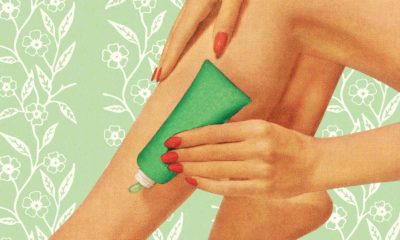The Female Gaze Powers the Photography Project ‘We Are Mary Jane’
Maria Cavali spotlights Amsterdam coffeeshops and the women who love them.
Some of the women in the photographs that comprise Maria Cavali’s “We Are Mary Jane – Women in Cannabis” stare directly into the camera lens. Others flick their eyes downward to focus on an inhalation or to watch smoke leak from their open mouths, while a few are caught laughing in response to something outside of the frame.
The images themselves are far from uniform, and purposefully so: Cavali photographs different women in different locations, with various degrees of planning and preparation beforehand.
“Sometimes I have an appointment with one person and that person is very late, and then while waiting I meet another person,” she says. “It’s kind of an adventure to me, to get these photos.”

The women in Cavali’s pictures do have a handful of things in common, however. They’re all part of the cannabis business, for one, involved in the industry touted as empowering for and inclusive of its female-identifying members. Maybe more importantly, the women captured in the series all exude a breezy confidence as they clutch their joints and pose for Cavali’s camera.
But the most vital, magnetic thing about the women who Cavali photographs, and the way Cavali photographs them, is how comfortable they seem to be with taking up space. They don’t perch — they occupy. They sit, legs akimbo, shoulders relaxed, seemingly guided by an assurance that they are enough — more than enough, even — to fill the room of one of Amsterdam’s famed coffeeshops all by themselves.
“I think [the women in the photos] can be even quite provocative, because they’re so strong,” says Hash Marihuana & Hemp Museum curator Simone Badoux. “These women look you straight in the eyes and say, ‘Yes, I’m smoking a joint, so what?’ They kick *ss.”

Badoux collaborated with Cavali, displaying the photographer’s work as a part of an exhibition at the Hash Marihuana & Hemp Museum titled “We Are Mary Jane,” which first opened in Amsterdam last year and centered around women in the cannabis industry.
Cavali dreamed of a career in photography as a teenager, but didn’t quite know how to pursue what she wanted. Born and raised in Lithuania, Cavali says her parents encouraged her to study something practical and career-oriented, so when it came time to pursue higher education, she wound up in school for a political science degree. However, she says she never stopped taking pictures, shooting her friends for free and dabbling in fashion photography.
But while on an internship related to her less-than-ideal area of study, Cavali found herself connecting with members of the freelance photography community in Amsterdam. This reignited her passion and opened her mind to the possibilities that Amsterdam and the world of photography had to offer. Cavali has lived and worked in Amsterdam for the past eight years. In the process, she’s made a space for herself and the life she wants in the city she loves — and in the cannabis community.

Actors In Their Own Right
“We Are Mary Jane” was born in a similar, meandering fashion to Cavali’s career. She simply feels inspired by the atmosphere that coffeeshops cultivate. “Life stops there,” she says. “You enter and then time stops.”
This admiration tipped into urgency on a day she was showing her older brother around her new city. She tried to take him to one of her favorite coffeeshops, a “sophisticated” spot decorated with “big bookshelves,” but found it was closed. She tried another of her favorites, only to find that it was closed as well.
“I researched, and actually [officials] closed over 30 coffeeshops [at the time],” Cavali said. “And I thought, oh, I want to capture this all before it fades away. And that’s how the project started.”

When she first embarked on the project in 2014, Cavali says the industry prominence of her subjects, not gender, was the priority. That changed when she was approached by Badoux, who asked her a paradigm-shifting question: Did she have more photos of women?
Badoux says she was alerted to Cavali’s work by a colleague and found herself drawn to the photo series because of the powerful energy exuded by its female subjects.
“Maria’s photos are very fresh and colorful, and she does an amazing job representing the actual character of her subjects – I find the photos all very empowering,” Badoux says. “The women photographed are not merely models; they are actors in their own right, with a story to tell.”

This attitude meshed well with Badoux’s goals for the exhibition as a whole: to galvanize and celebrate women who work with and use cannabis.
“I believe women play a pivotal role in the normalization of cannabis consumption,” Badoux says. “I hope people will feel inspired as well as amazed by the many stories about strong personalities of the women in the cannabis industry, from the past and present.”

The Space to Grow
When working on her submission to the “We Are Mary Jane” exhibition, Cavali began seeking out women to photograph. She says the more she was able to connect with them, the more her appreciation for their niche in the cannabis community, and of cannabis itself, deepened.
In the future, she wants to find more ways to connect her work with the cannabis community, especially as it relates to sustainability. And she says she’s eager to donate her photography skills and her time to the right cause — as soon as she finds the right fit.
“I would like to be involved in creating some better world using cannabis,” Cavali says. “And I’m sure that because I’m meeting so many women in cannabis that something will come up.”

And in the meantime, she says that just because her work has already been displayed in museums internationally, at both the Amsterdam and Barcelona locations of the Hash Marihuana & Hemp Museum, doesn’t mean that it is finished.
Cavali continues to cast her net wide for more subjects for “We Are Mary Jane” and has tentative plans for where she thinks she’d like it to go next: as a series of postcards sold in coffeeshops, or maybe even a book printed on hemp paper with joint-rolling instructions included. But the important thing remains that the project continues to evolve and grow.
“Every time I have some publicity, I have more women in cannabis approaching me,” Cavali says. “And maybe they’re traveling to Amsterdam and then I get to photograph them! I think it’s a great way to spread the word and continue the work.”
TELL US, have you ever been photographed enjoying cannabis?
Originally published in Issue 38 of Cannabis Now. LEARN MORE





















